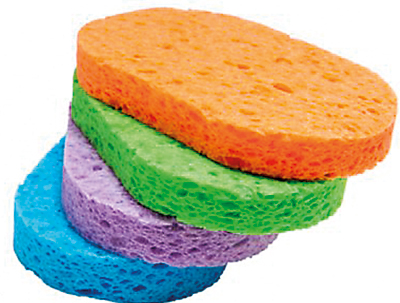Sunday Times 2
The kitchen sponge is 200,000 times dirtier than a toilet seat
It may come as a surprise to the houseproud and ‘clean freaks’ among us but the kitchen sponge is one of the dirtiest places in the home – 200,000 times dirtier than a toilet seat. And it is not just harmless bacteria lurking on your cleaning cloths and utensils.
Experts have linked germs found on sponges, cloths and chopping boards with a bacteria which can cause paralysis. A new study has found there are around 10million bacteria per square inch of a kitchen sponge and a million per square inch on a dish cloth.

Friend or foe? Far from being a tool to clean your home, the sponge could be making it dirtier and more dangerous
And you would be better off chopping your vegetables on a toilet seat than on a chopping board when it comes to germs, scientists have claimed. Dr Charles Gerba, professor of microbiology at the University of Arizona, leads studies on how diseases are transferred through the environment.
His work involves swabbing household items and measuring the type and growth of bacteria.
He told the BBC the toilet seat is one of the cleanest things you’ll run across in terms of micro-organisms.
But he said we should be more worried about other household items, such as sponges, dish cloths, and reusable shopping bags.
Professor Hugh Pennington, one of Britain’s leading microbiologists, agreed the kitchen and in particular the sponge was among the dirtiest places in the home. He told MailOnline: ‘It would be fine to use the sponge to wash up with, wiping food off the plates in hot water, but never, never use a sponge to wipe a plate clean.
‘There is a science to this sort of thing, and it’s not rocket science. There is a certain amount of common sense.’
Prof Pennington said one of the biggest targets for the Health Protection Agency was a bacteria called campylobacter – which can cause paralysis and is commonly found on kitchen sponges.
He said: ‘It is naturally occurring and comes from poultry. ‘It can cause something called Guillain-Barre syndrome.
‘It doesn’t affect your thinking or feeling, but it can spread to the peripheral nerves around the brain and effect movement. ‘People can be effectively locked in.’
In the majority of cases, people will get better, but recovery can take weeks, months or years.
‘Always the dirtiest thing by far is the kitchen sponge,’ adds John Oxford, professor of virology at the University of London and chair of the Hygiene Council – the body that compares hygiene standards across the world.
In its latest study the council examines samples from homes in nine different countries, and finds that 21per cent of ‘clean’ kitchen cloths actually have high levels of contamination. The study identifies faecal bacteria in other places around the home, and this varies from one country to another.
According to the study Saudi Arabia has the dirtiest fridges, with 95 per cent of the fridges in the study failing the bacteriology test for E.coli. In South Africa, the dirtiest item is the bath seal, with almost two-thirds with concerning levels of E.coli and 40per cent for mould.
© Daily Mail, London
Follow @timesonlinelk
comments powered by Disqus



















